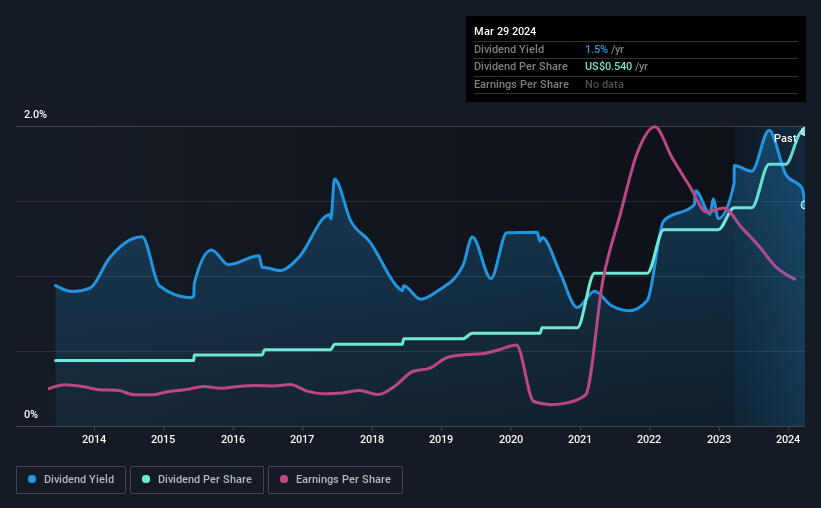Shoe Carnival, Inc. (NASDAQ:SCVL) Looks Interesting, And It's About To Pay A Dividend
Shoe Carnival, Inc. (NASDAQ:SCVL) stock is about to trade ex-dividend in 4 days. The ex-dividend date is one business day before the record date, which is the cut-off date for shareholders to be present on the company's books to be eligible for a dividend payment. The ex-dividend date is important as the process of settlement involves two full business days. So if you miss that date, you would not show up on the company's books on the record date. Meaning, you will need to purchase Shoe Carnival's shares before the 5th of April to receive the dividend, which will be paid on the 22nd of April.
The company's next dividend payment will be US$0.135 per share. Last year, in total, the company distributed US$0.54 to shareholders. Based on the last year's worth of payments, Shoe Carnival has a trailing yield of 1.5% on the current stock price of US$36.64. Dividends are an important source of income to many shareholders, but the health of the business is crucial to maintaining those dividends. We need to see whether the dividend is covered by earnings and if it's growing.
Check out our latest analysis for Shoe Carnival
Dividends are usually paid out of company profits, so if a company pays out more than it earned then its dividend is usually at greater risk of being cut. Shoe Carnival is paying out just 16% of its profit after tax, which is comfortably low and leaves plenty of breathing room in the case of adverse events. A useful secondary check can be to evaluate whether Shoe Carnival generated enough free cash flow to afford its dividend. What's good is that dividends were well covered by free cash flow, with the company paying out 18% of its cash flow last year.
It's encouraging to see that the dividend is covered by both profit and cash flow. This generally suggests the dividend is sustainable, as long as earnings don't drop precipitously.
Click here to see the company's payout ratio, plus analyst estimates of its future dividends.
Have Earnings And Dividends Been Growing?
Companies with consistently growing earnings per share generally make the best dividend stocks, as they usually find it easier to grow dividends per share. Investors love dividends, so if earnings fall and the dividend is reduced, expect a stock to be sold off heavily at the same time. For this reason, we're glad to see Shoe Carnival's earnings per share have risen 17% per annum over the last five years. Earnings per share have been growing rapidly and the company is retaining a majority of its earnings within the business. Fast-growing businesses that are reinvesting heavily are enticing from a dividend perspective, especially since they can often increase the payout ratio later.
Another key way to measure a company's dividend prospects is by measuring its historical rate of dividend growth. Since the start of our data, 10 years ago, Shoe Carnival has lifted its dividend by approximately 16% a year on average. Both per-share earnings and dividends have both been growing rapidly in recent times, which is great to see.
Final Takeaway
Is Shoe Carnival an attractive dividend stock, or better left on the shelf? Shoe Carnival has been growing earnings at a rapid rate, and has a conservatively low payout ratio, implying that it is reinvesting heavily in its business; a sterling combination. There's a lot to like about Shoe Carnival, and we would prioritise taking a closer look at it.
In light of that, while Shoe Carnival has an appealing dividend, it's worth knowing the risks involved with this stock. Our analysis shows 1 warning sign for Shoe Carnival and you should be aware of this before buying any shares.
A common investing mistake is buying the first interesting stock you see. Here you can find a full list of high-yield dividend stocks.
Have feedback on this article? Concerned about the content? Get in touch with us directly. Alternatively, email editorial-team (at) simplywallst.com.
This article by Simply Wall St is general in nature. We provide commentary based on historical data and analyst forecasts only using an unbiased methodology and our articles are not intended to be financial advice. It does not constitute a recommendation to buy or sell any stock, and does not take account of your objectives, or your financial situation. We aim to bring you long-term focused analysis driven by fundamental data. Note that our analysis may not factor in the latest price-sensitive company announcements or qualitative material. Simply Wall St has no position in any stocks mentioned.

